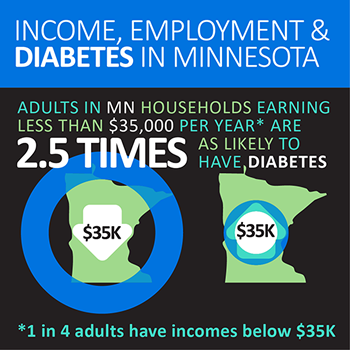Report: Income, Employment and Diabetes in Minnesota
Background and key findings
More than 7% of Minnesota adults report having diabetes. However, that percentage is not spread evenly across people with different incomes. Looking closely at income and employment for people with diabetes, MDH found that working-age adults (18 to 64) who live in households earning less than $35,000 a year are two-and-a-half times as likely to report having diabetes as those with incomes higher than $35,000.
Read the full report: Income, Employment and Diabetes in Minnesota (PDF).
Additional findings:
- Households earning less than $35,000 a year are not uncommon. About 1 in every 4 adults in Minnesota lives in a household earning less than $35,000.
- More than 80 percent of adults 18-64 years old belonging to households earning less than $35,000 would be considered to be living in poverty or to have low incomes (incomes less than two-times the Federal Poverty Level).
Did low income come first or diabetes?
 MDH cannot tell from this data. However, scientific literature suggests that having low income or socioeconomic status in childhood or mid-life can contribute to developing diabetes. On the other hand, the scientific literature demonstrates that working-age adults with diabetes are more likely to exit the workforce, retire early, and to have less earnings than their counterparts without diabetes.
MDH cannot tell from this data. However, scientific literature suggests that having low income or socioeconomic status in childhood or mid-life can contribute to developing diabetes. On the other hand, the scientific literature demonstrates that working-age adults with diabetes are more likely to exit the workforce, retire early, and to have less earnings than their counterparts without diabetes.
Minnesota data show more than one in three working-age adults living with diabetes is not working, which may mean he/she is unable to work, retired, or chose not to work, compared to one in ten who do not have diabetes, a difference that is not explained entirely by the older age of adults with diabetes.
What can we do to make things better?
Diabetes management programs
Shape programs that help all people with diabetes manage their disease. Improve access and eliminate barriers to full participation among people who have low incomes.
- Embrace worksite wellness programs that may reach around half of working-age adults with diabetes.
- Ensure that diabetes prevention and management programs offered through employers are accessible to adults who are working, but earning low incomes (<200% of Federal Poverty Level)
- Since more than 33% of adults 18-64 years of age who are living with diabetes are not working, engage sectors beyond employers to address the need of people with diabetes.
- Eliminate co-pays and other cost-related barriers to participation in diabetes prevention and diabetes management programs, especially among Minnesota adults who are not working and are, thus, more likely to have low incomes.
Invest in diabetes prevention
Investing in prevention ranges from building environments that support healthy eating and physical activity to improving food access and affordability. Empower communities, clinics and employers to offer research-tested programs designed to help people at increased risk for developing type 2 diabetes lower their risk.
- Employers, insurers, and communities all can support diabetes prevention. Worksite-related programs may reach up to two-thirds of the working-age population without diabetes.
- For existing and new programs, remove cost-related barriers like co-pays to program participation for people with low incomes and make programs available to employees without insurance.
- Specifically, support efforts to make the National DPP accessible to all eligible adults regardless of their income level.
Address social determinants of health
Social determinants of health are broader issues associated with poverty and life that impact health, such as:
- lack of employment or under employment
- housing
- food security
- health coverage
- educational opportunity
- the intersection of these factors with race/ethnicity
Ensuring equitable access to these resources for all Minnesotans will contribute to efforts to prevent and better manage diabetes in Minnesota.
For more information
Download the complete report: Income, Employment and Diabetes in Minnesota (PDF).
Learn more about diabetes, income and employment in Minnesota at MN Public Health Data Access.
If you have questions about diabetes in Minnesota, contact: Renée Kidney (651) 201-5429.